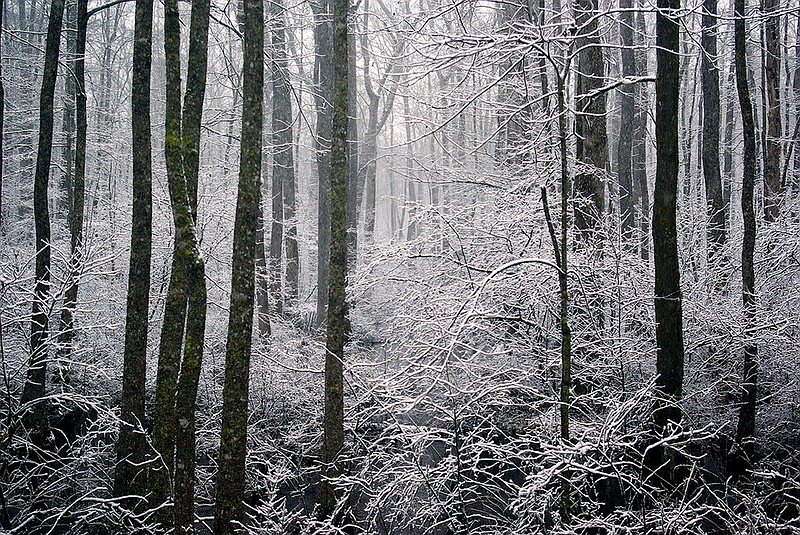Winter will soon end. On this February day, however, the season holds tight the pallid landscape.
My breath swirls like storm clouds. I am freezing, but as I lean against a tree that has survived a hundred winters, something tells me I should stay.
A white-tailed deer suddenly appears — a big buck with a big rack. How majestic he is! His footsteps are silent, his antlers tall and wide. He is heavy and wary and old.
I watch him for the fleeting moment I am given, and when he leaves, I bid him well. This winter may be his last.
The tracks lead into a blackberry thicket at the bottom of the slope. I have followed them here from a friend’s old red barn on the ridge top. Last night, as snow fell, a cottontail hid beneath the aged structure. But when the sun rose, the rabbit left. Its tracks say it was hurried. Perhaps a fox was after it, or a coyote or maybe a hawk.
It matters not. The rabbit will die anyway.
I see his eye first. It is the one flaw in his camouflage. All else blends with the brambles, but the round, black eye stares out.
My bullet passes cleanly through the rabbit’s head.
I lift him and rub him against my face. His softness and warmth feel good.
The snow is crimson where he lay. I stare at it, transfixed. Red blood on white snow: death passed here, it says.
I do not grieve for the rabbit, however. He had to die as all things die. And I am glad it was me who took his life. Tonight, he will provide a healthy, delicious dinner for my family and me. And when we eat him, we shall thank him. He died that we might be well fed.
Snowflakes fall harder now, pearly butterflies clinging to my face with cold feet. For some reason, they bring fire to mind. A hearth with burning logs. Warmth on my backside. I trudge faster toward home.
On the far side of a creek, I find more rabbit tracks. They end at another thicket, and from within, a black eye stares.
Suddenly, the rabbit bolts. A bobcat bolts with him.
I do not see the drama played out, but as I continue uphill, I hear the rabbit’s cries. The cottontail dies. The bobcat eats. Once again, the circle of life is complete.
Across on another hill, I hear beagles. It seems they might come my way, but it is not to be. The dogs turn. I strain to see them through the falling snow but cannot.
I do not see him, either, but I feel the presence of another hunter. I wonder if he is listening to his dogs as they chase the cottontail. And though I know nothing of this man, I wonder if he, too, is feeling melancholy.
Today is the season’s end. Months will pass before I can spend a day as I have spent this one. So on this, the last day of February, I can’t help but feel sad.
The season will end when the sun sets. It is natural I should want to share my disheartenment with another, even if he is a stranger.
Many hunters I know eagerly anticipate the beginning of each season. Vacations are planned to coincide with opening week. For a few days, hunting takes precedence over all else. Charles Fergus touched on it in his book A Rough-Shooting Dog: “For the hunter, fall is the island and the rest of the year is the swim.”
So it is with most. But for me, it is the end of the season, not the beginning, that most stirs my soul. I swim to the island of fall, then continue to the shore of winter.
Things are different this season. Winter embodies privacy unknown in other seasons. Spring, summer and fall open their arms to people. Winter is standoffish. It has fewer friends, and so, in winter, one can savor longer periods of solitary peacefulness.
I also am enticed by the season’s stark contrasts. We often dismiss winter as a time of lusterless grays and dull browns. But colors are never richer than in this resting world where everything is more elemental and direct. The reds of a cardinal are twice as red against February’s stark backdrop. The cedars are never greener. The turquoise sky and violet shadows of the trees are feasts for the eyes.
When snow falls, the world is cleansed. The landscape’s scars vanish. Everything is covered in white, and nature seems renewed. Every animal writes the story of its activities in the snow. These things, too, draw me outside in winter.
In the end, however, I venture out at season’s end for one reason: I want to be reassured hunters can still hunt without need for penance. I want to be reminded that death is part of life, and killing an animal to eat is as natural as the urge to procreate.
These things are most evident when I am cold and alone at season’s end. No one is there demanding apologies for my actions. No one will chide me for my actions, which are as natural to me as a bobcat killing a rabbit, or winter’s cold killing a deer. When I am out there in the winter cold, for a moment, I feel truly one with nature.
It is then I feel most human. And when the sun sets that final day, I grieve, for I will not possess that feeling again until another year passes.
Across the hillside, I see the rabbit hunter. We meet in the swale leading up to the barn.
“Last day of the season,” he says. “I always hate to see it come.”
“Me, too,” I reply. “Me, too.”
